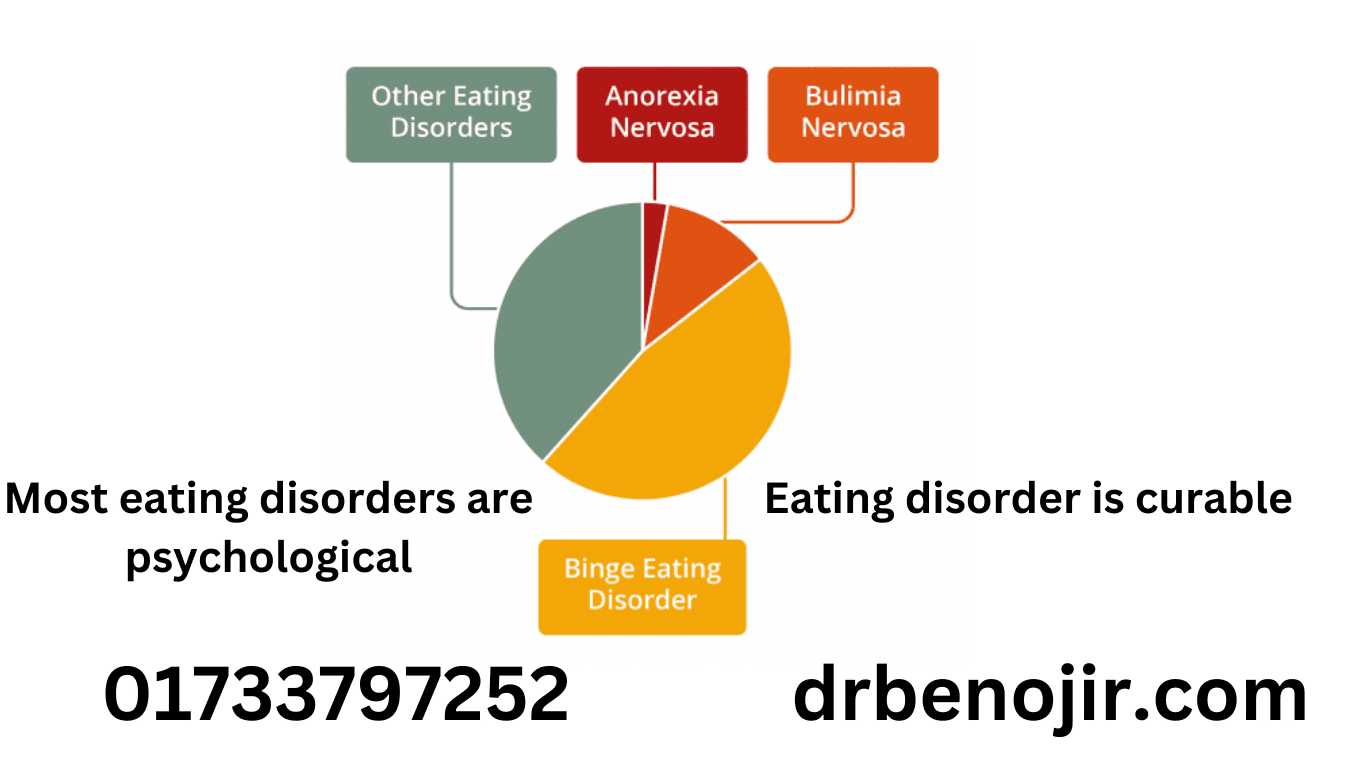Eating disorders are serious mental illnesses that can have a devastating impact on a person’s physical and emotional health. They are characterized by disordered eating behaviors, such as excessive dieting, binge eating, purging, and excessive exercise. Eating disorders can affect people of all ages, genders, and races.
There are 3-types of eating disorders:
- Anorexia Nervosa: It is defined by the restriction of nutrient intake relative to requirements, which leads to significantly low body weight. Patients with this eating disorder will have a fear of gaining weight along and a distorted body image with the inability to comprehend the seriousness of their condition.
- Bulimia nervosa: It is commonly called bulimia, is a serious, potentially life-threatening eating disorder. People with bulimia may secretly binge — eating large amounts of food with a loss of control over the eating — and then purge, trying to get rid of the extra calories in an unhealthy way.
- Binge eating is when you eat a large amount of food in a short amount of time and feel you can’t control what or how much you are eating. If you binge eat regularly—at least once a week for 3 months—you may have a binge eating disorder. If you have a binge eating disorder, you may be very upset by your binge eating
The exact causes of eating disorders are not fully understood, but they are thought to be a combination of biological, psychological, and environmental factors. Some of the potential causes of eating disorders include:
- Genetics: Some people may be more genetically predisposed to developing an eating disorder.
- Biological factors: Changes in brain chemistry, such as low levels of serotonin, may play a role in eating disorders.
- Psychological factors: eating disorders are often associated with other mental health conditions, such as anxiety, depression, and obsessive-compulsive disorder.
- Environmental factors: Cultural factors, such as the emphasis on thinness in the media, can contribute to the development of eating disorders.
There is no one-size-fits-all treatment for eating disorders, but there are a variety of effective interventions available. In conventional methods, treatment typically involves a combination of therapy, medication, and nutritional counseling.
Some of the most common types of therapy for eating disorders include:
- Cognitive-behavioral therapy (CBT): CBT helps people to identify and challenge distorted thoughts about food, weight, and body image.
- Interpersonal therapy (IPT): IPT helps people to improve their relationships and communication skills.
- Family therapy: Family therapy can help to improve communication and understanding within the family.
Medications may also be used to treat eating disorders, especially if they are co-occurring with other mental health conditions. Some of the medications that may be prescribed for eating disorders include:
- Antidepressants: Antidepressants can help to improve mood and reduce anxiety, which can be helpful in treating eating disorders.
- Antipsychotics: Antipsychotics can help to reduce obsessive-compulsive thoughts and behaviors.
- Stimulants: Stimulants can help to reduce fatigue and improve concentration, which can be helpful in treating eating disorders.
Nutritional counseling is also an important part of treatment for eating disorders. A registered dietitian can help people to develop healthy eating habits and to learn how to manage their weight in a healthy way.
Eating disorders are serious illnesses, but they are treatable. With the right treatment, people with eating disorders can recover and live healthy, fulfilling lives.
If you or someone you know is struggling with an eating disorder, please seek professional help from either a dietitian or a qualified homeopath.
Homeopathy is a holistic and symptom-based treatment and helps cure any type of eating disorder. There are more than 60 medicines for anorexia nervosa, bulimia, and other eating disorders.

